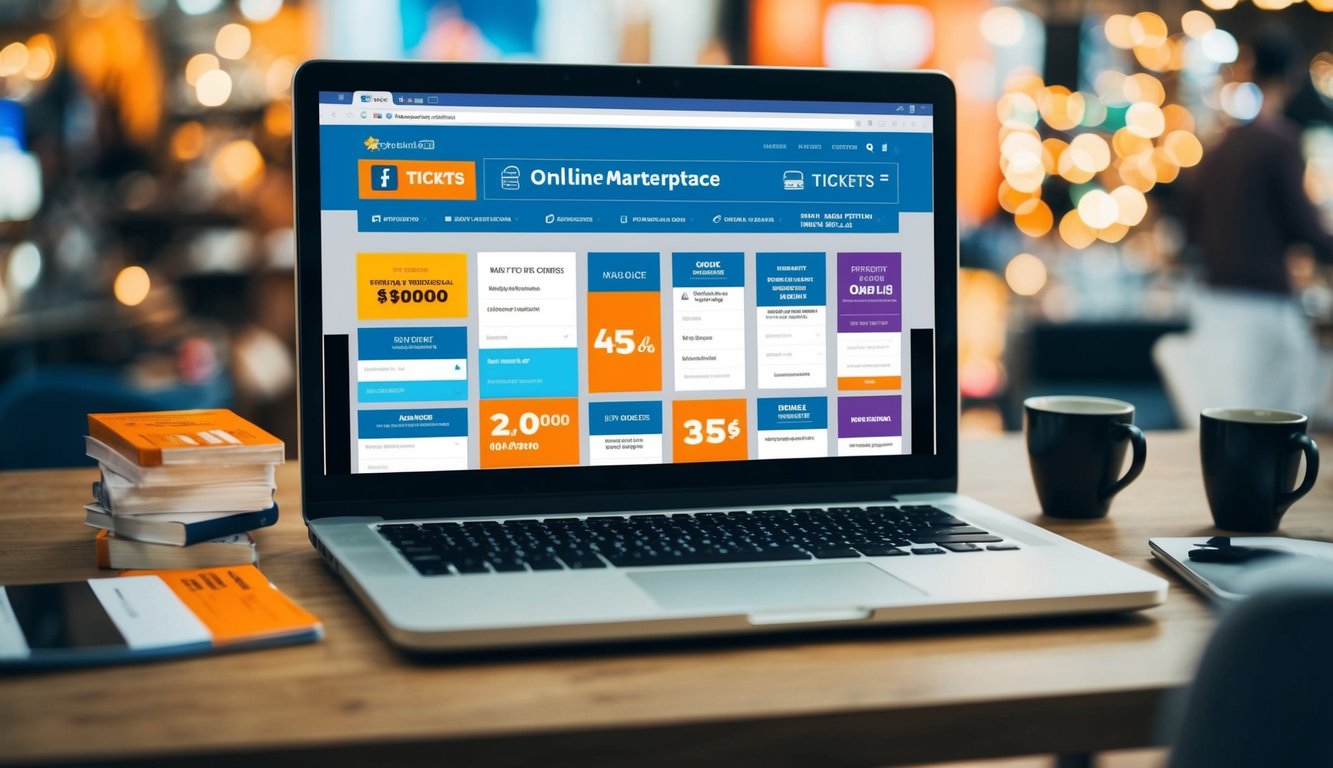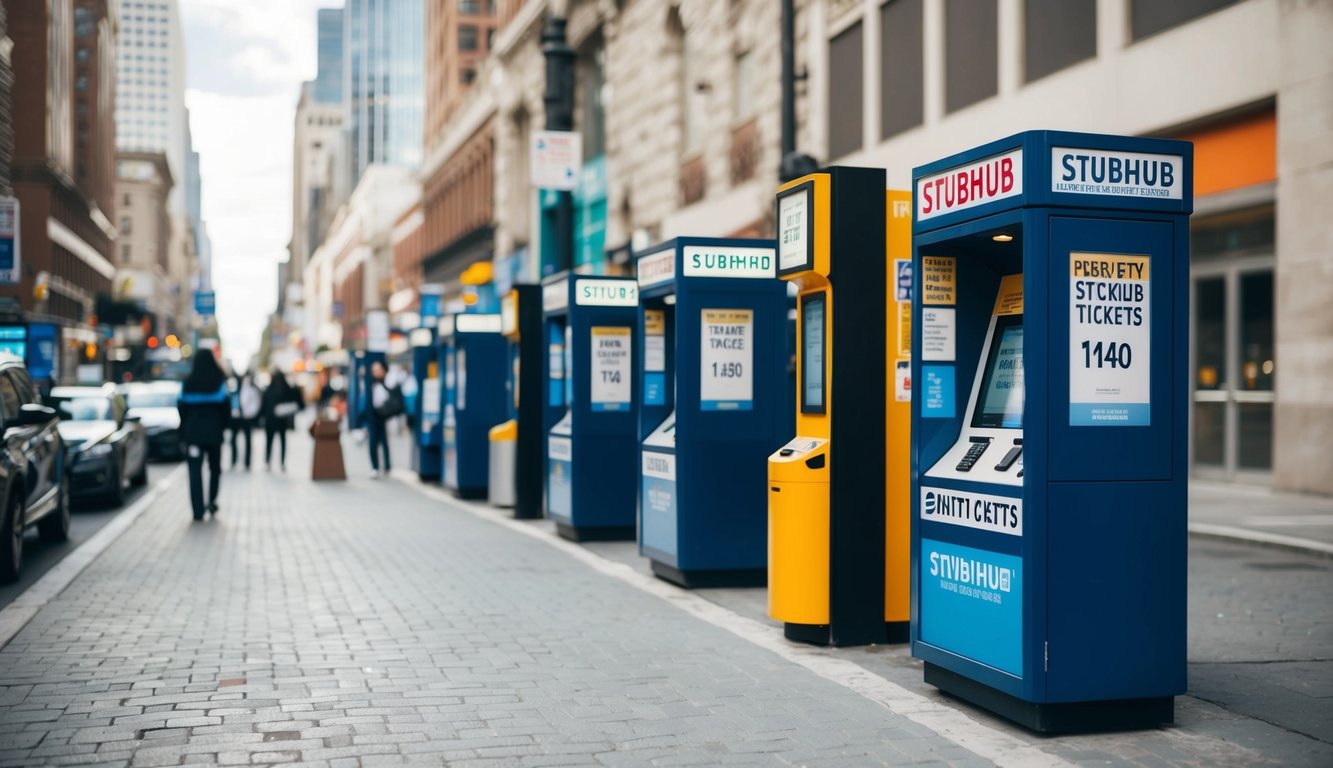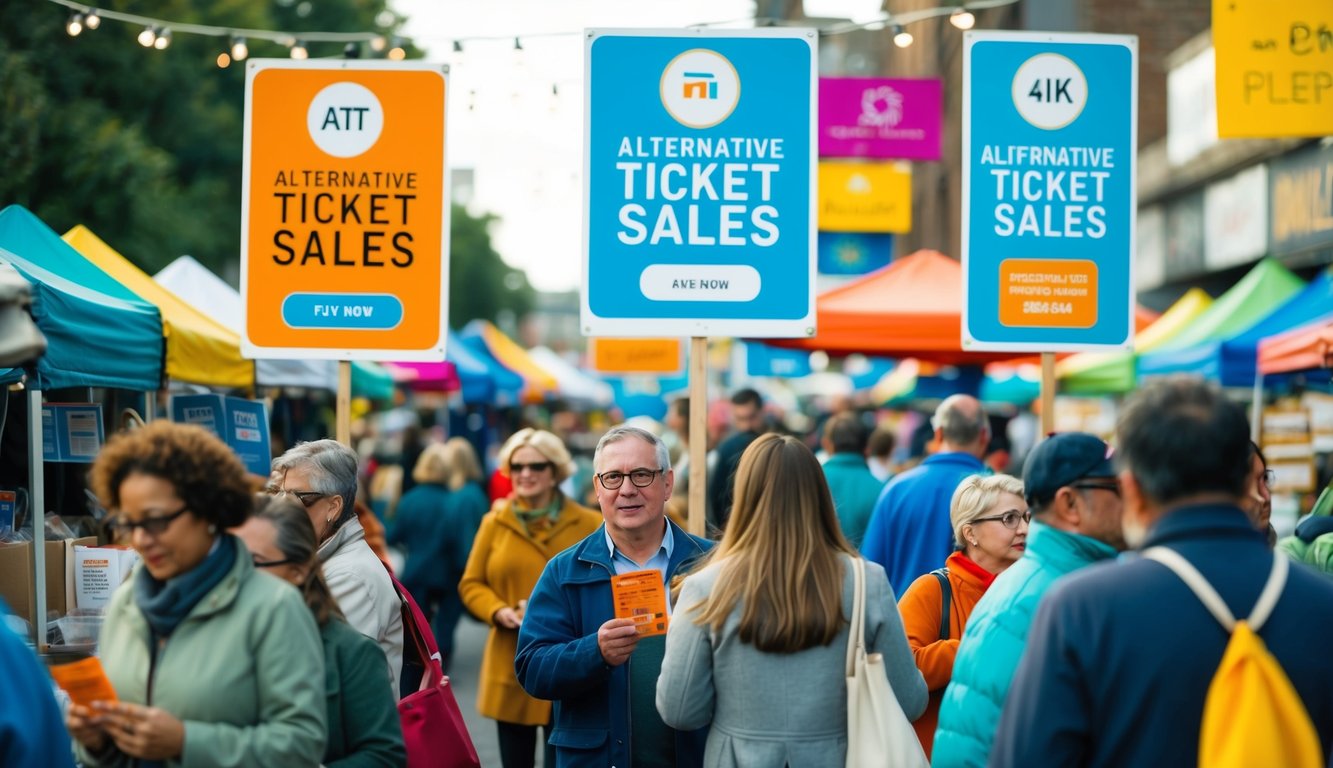Looking for a new way to buy or sell event tickets? You’re not alone. Many people are searching for StubHub alternatives to find better deals and different features.
The ticket resale market offers several options beyond StubHub, including SeatGeek, Razorgator, and Vivid Seats.

These platforms provide unique benefits for both buyers and sellers. Some offer lower fees, while others have special tools to help you find the best seats.
It’s worth checking out a few different sites to see which one fits your needs best.
When exploring new ticket marketplaces, keep an eye on things like buyer guarantees and hidden costs. Each platform has its own policies that can affect your experience.
By comparing different options, you can find a site that gives you peace of mind and potentially saves you money on your next event tickets.
Key Takeaways
- Several ticket resale platforms offer unique features and potentially lower fees than StubHub
- Comparing different sites can help you find the best deals and most suitable options for buying or selling tickets
- Look closely at buyer guarantees and extra costs when choosing a ticket marketplace
Understanding the Ticket Resale Market
The ticket resale market lets fans buy and sell tickets for live events. It connects people who can’t use their tickets with those looking for seats. This system has both good and bad sides for buyers and sellers.
The Role of Ticket Resale Sites
Ticket resale sites act as middlemen between ticket buyers and sellers. They provide a platform where people can list tickets they want to sell. Others can then browse and buy these tickets.
These sites often offer:
- A wide range of events
- Easy-to-use search tools
- Secure payment options
- Buyer guarantees
Popular ticket marketplaces include StubHub, SeatGeek, and Ticketmaster’s resale platform. They make money by charging fees to both buyers and sellers.
Ticket resale has changed how people get tickets to shows, games, and concerts. It gives fans more chances to attend sold-out events. But it also led to worries about ticket scalping, where people buy tickets just to resell them at higher prices.
Pros and Cons of Buying Resale Tickets
Buying resale tickets has its ups and downs. Here’s what fans should know:
Pros:
- Access to sold-out events
- Possible last-minute deals
- Wider seat selection
Cons:
- Often higher prices
- Risk of fake tickets
- Fees can be steep
Resale sites try to protect buyers with guarantees. These promises help if tickets turn out fake or don’t arrive. But prices can be much higher than face value, especially for popular shows.
For sellers, resale sites offer a way to recoup money for unused tickets. They can reach a big audience of potential buyers. Yet, fees can cut into their profits.
Top StubHub Alternatives

StubHub isn’t the only game in town for buying and selling event tickets. Several other platforms offer unique features and potential savings. Let’s explore some top choices for ticket buyers and sellers.
SeatGeek and Deal Score
SeatGeek stands out with its Deal Score feature. This handy tool rates ticket prices from 1-100. A higher score means better value.
SeatGeek’s search engine makes finding events easy. You can compare prices across many sites. The platform’s fees are often lower than StubHub’s.
Their mobile app is user-friendly. It lets you buy tickets on the go. You can also set alerts for your favorite artists or teams.
SeatGeek partners with many sports teams and venues. This gives users access to a wide range of events.
Ticketmaster’s Legacy
Ticketmaster is a big name in ticket sales. They’re often the first stop for many event-goers.
The site sells tickets directly from venues and artists. This can mean better prices and seat choices. You might avoid some resale markups.
Ticketmaster’s Verified Fan program aims to get tickets to real fans. It helps reduce scalping. The Fan-to-Fan Resale feature lets you buy and sell tickets safely.
Their mobile app makes it easy to manage tickets. You can transfer or sell tickets right from your phone.
Vivid Seats’ FanProtect Guarantee
Vivid Seats offers a strong buyer protection program. Their FanProtect Guarantee ensures you get valid tickets. If not, they’ll find replacements or give you a refund.
The site often has competitive prices. They also run sales and promotions. This can lead to good deals on tickets.
Vivid Seats has a rewards program. You can earn credit on purchases. The mobile app is user-friendly and packed with features.
The platform covers a wide range of events. You’ll find tickets for sports, concerts, and theater shows.
Exploring Less-Known Options
Some smaller sites can offer great deals. TickPick stands out with its “all-in pricing” model. The price you see is what you pay. No surprise fees at checkout.
Razorgator and Ticket Liquidator are worth a look. They might have tickets for events sold out elsewhere. TicketNetwork is another solid choice. It connects buyers with a network of sellers.
These sites often have lower fees than big names. But be sure to compare prices across platforms. Sometimes less-known sites have the best deals.
Remember to check seller ratings and reviews. This helps ensure a safe purchase on any platform.
Customer Service and Guarantees

Ticket resale sites offer different levels of buyer protection and support. Some key features to look for include money-back guarantees and responsive customer service teams.
Assurance Programs for Safe Purchases
Many StubHub alternatives provide buyer guarantees to ensure safe transactions.
SeatGeek offers a 100% buyer guarantee, promising valid tickets that arrive on time. If issues arise, they’ll find comparable or better tickets.
Vivid Seats has a similar program called the FanProtect guarantee. This assures customers get authentic tickets for the correct event and date. If problems occur, Vivid Seats commits to finding replacement tickets or giving a full refund.
These programs give buyers peace of mind when purchasing from resale sites.
Navigating Refunds and Customer Support
When events get canceled or rescheduled, good customer support becomes crucial. Some sites make it easier than others to get help or refunds.
Ticket Liquidator stands out with its 100% money-back guarantee. They promise full refunds if events are canceled and not rescheduled. This policy can save buyers headaches in uncertain times.
For general inquiries, look for sites with dedicated in-house support teams. Quick response times and multiple contact methods (phone, email, chat) are signs of strong customer service. These features help resolve issues fast, whether it’s about refunds, ticket delivery, or event changes.
Value-Added Features for Buyers and Sellers

Ticket resale platforms offer perks to keep users coming back. These extras make buying and selling tickets easier and more rewarding.
Loyalty Programs Benefits
Many ticket sites have loyalty programs. Users earn points when they buy or sell tickets. These points can be traded for discounts or free tickets later. Some programs have tiers. Higher tiers give better perks.
SeatGeek offers a Deal Score feature. It helps buyers spot good deals. This can save money and time.
Sellers can get perks too. They might get lower fees or earlier payouts. This makes selling tickets more profitable.
Mobile Apps and User Experience
Most big ticket sites have mobile apps. These apps make it easy to buy or sell on the go. Users can get alerts about price drops or new tickets.
The apps often have features desktop sites don’t. Some let users scan paper tickets to list them for sale. Others use location services to find nearby events.
StubHub alternatives focus on user-friendly design. Clear layouts and simple buttons help users find what they need fast. Many apps also offer digital ticket delivery. This saves time and paper.
Some platforms have virtual seating charts. These help buyers see the view from their seats before buying. It’s a great way to avoid bad surprises at the event.
Pricing Strategies and Hidden Costs

Ticket prices can vary widely between platforms. Fees and pricing methods play a big role in the final cost. Looking closely at these factors helps buyers find the best deals.
The Impact of Fees on Ticket Prices
Many ticket sites charge extra fees on top of the ticket price. These hidden fees can affect your bottom line. Some common fees include:
• Service fees
• Processing fees
• Delivery fees
These costs can add up fast. For example, StubHub often charges a 10% fee to buyers and a 15% fee to sellers. That means a $100 ticket could end up costing $110 or more.
Some sites use upfront pricing. This shows the full price right away. It helps avoid surprises at checkout. Buyers like this method because it’s clear and honest.
Comparing Ticket Options and Pricing
When looking at different ticket sites, price isn’t the only thing to check. Here are some tips:
- Look at the total cost, including all fees
- Check if the site uses dynamic ticket pricing
- See if they offer price matching
Some sites have tools to help compare prices. These can show you if you’re getting a good deal. They might also show seat quality and value.
It’s smart to check a few different sites. Prices can vary a lot for the same event. Some sites might have better deals for certain types of events.
Alternative Platforms for Ticket Sales

Fans now have many choices beyond StubHub for buying and selling tickets. These options offer unique features and benefits for event-goers looking for deals or flexibility.
The Rise of Social Marketplaces
Social platforms have become popular spots for ticket sales. Facebook’s event pages let people post extra tickets. Local buy/sell groups also work well for finding deals.
Craigslist remains a top choice for person-to-person sales. It’s free to use and works for local events. Buyers can often get good prices by dealing directly with sellers.
eBay is another big player. Its auction format can lead to great deals. The site offers buyer protections too.
New apps like TicketSwap focus on social sharing. Users can easily sell to friends or followers. This builds trust between buyers and sellers.
Advantages of Peer-to-Peer Exchanges
Direct exchanges between fans have clear perks. Prices are often lower without middleman fees. Buyers and sellers can chat to work out details.
Viagogo is a global platform that connects fans worldwide. It’s great for international events or tourists seeking tickets.
Gametime targets last-minute sales. Their app makes it easy to find and buy tickets right before an event starts. This is perfect for spontaneous plans.
Goldstar offers discounted tickets to many shows and events. They work with venues to fill empty seats. This means fans can score great deals on fun experiences.
Tips for Buying Tickets Responsibly
Buying tickets can be tricky. It’s important to be careful and smart. Here are some tips to help you get good tickets without problems.
Avoiding Risky Transactions
When buying tickets, be careful of fake sellers. Only buy from trusted websites or official box offices.
Check the seller’s ratings and reviews if you’re using a resale site. Make sure the ticket details match the event you want to attend.
Look for secure payment methods. Avoid paying with cash or wire transfers. Use credit cards or PayPal for better protection.
Be wary of deals that seem too good to be true. If the price is much lower than other sites, it might be a scam. Always double-check the event date, time, and venue before buying.
Maximizing Value in Last-Minute Purchases
Waiting until the last minute can sometimes lead to good deals. Many sellers drop prices as the event gets closer. But this can be risky if the event is popular.
Use price tracking tools to watch ticket costs. Some websites like SeatGeek show price trends. This can help you decide when to buy.
Be flexible with your seats. You might find better deals if you’re open to different sections. Sometimes, less desirable seats get big discounts close to the event date.
Sign up for email alerts from ticket sites. They often send out last-minute deals to subscribers. But be ready to act fast when you see a good offer.




